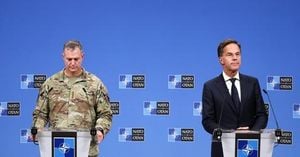The recent COP29 climate conference held in Baku, Azerbaijan, has emerged as a pivotal moment for global climate action, attracting worldwide attention and contributions from various sectors, including politics, sports, and civil society. From November 11 to 22, 2024, leaders, negotiators, and environmental advocates gathered to tackle pressing climate issues, explore cooperative efforts, and develop advanced frameworks aimed at reducing carbon emissions.
Baku has rolled out the red carpet for this major international gathering, emphasizing its commitment to addressing climate change. The Azerbaijani capital played host not only to world leaders but also to multiple side events focusing on innovative solutions and grassroots initiatives. Among the notable attendees were UN Secretary-General António Guterres, Azerbaijan’s President Ilham Aliyev, and representatives from the United States, Brazil, and Qatar, all engaged with the pressing challenges posed by climate impacts.
Interestingly, the conference saw participation from the European Club Association (ECA), which hosted its inaugural event dedicated to addressing climate change through football. Partnering with key stakeholders, including Qarabağ FK, the ECA highlighted the role of sports organizations as catalysts for climate action. ECA CEO Charlie Marshall stated, "At COP29, ECA acknowledges our responsibility to play an active role in combating the climate crisis." This commitment is underscored by their Sustainability Strategy, which includes initiatives aimed at reducing carbon emissions by 30% across its member organizations by 2030.
The ECA’s efforts included showcasing sustainability projects from major clubs such as Atlético de Madrid and Liverpool FC, helping to reinforce the message of climate responsibility within the football community. One significant moment was the signing of the Declaration establishing the Football Clubs Alliance for Climate. This initiative encourages football clubs worldwide to join forces against climate change, thereby promoting environmental stewardship across the globe.
Australia's Bushfires has become emblematic of the devastating impacts of climate change, yet it’s not just about natural disasters. The difficulties faced by vulnerable communities, particularly those affected by rising sea levels, wildfires, and unpredictable weather, were also focal points of discussions. The need to secure financing and technological support for developing countries to adapt to climate change was stressed during the talks.
Another haunting aspect of the conference was the recognition of the socio-political convergence between human rights violations and environmental degradation. Amidst the climate updates, discussions explored how conflict zones are often the most susceptible to climate-related harm due to lack of infrastructure, exacerbated by political instability. The high-profile presence of officials from the Kurdistan Regional Government (KRG) underscored this link, as they engaged with international experts on climate adaptation strategies suitable for their region.
The KRG delegation participated actively, discussing how to leverage sustainable practices from global dialogues and seeking economic investments to tackle environmental degradation specific to their region. Bayan Sami Abdul Rahman, Senior Advisor to the Prime Minister of the KRG, noted the importance of integrating international standards for combating climate impacts, showcasing the importance of collaborative efforts.
While numerous discussions took place surrounding these themes, the atmospheric spirit within the conference continued to remind participants of the growing urgency to act. COP29 didn't just serve as another international forum; it was more of a call to action, urging the global community to rally together for transformative change.
Through various panels and presentations, numerous synergies were formed, reflecting the importance of solidarity and joint action. It became clear to all present: addressing climate change requires collective will, innovative approaches, and the determination to pivot from mere words to meaningful actions.
Yet, concerns were raised by various stakeholders about the adequacy of the current dialogues and commitments. Environmental advocates called for stronger, binding commitments and integrated policies to assure the promises made do not falter post-conference. One notable segment was the panel focusing on how regions with historical tensions, such as the Caucasus, must not only address climate impacts but also promote peace as they seek sustainable futures.
Highlights from the summit included energetic discussions on reducing fossil fuel dependency, transitioning to renewable energy sources, and ensuring biodiversity protection. Key stakeholders emphasized the stark reality of fast-approaching deadlines to turn the tide against climate catastrophe. Delegates from nations with significant projections of urban growth underscored the necessity of smart urban planning to reduce environmental footprints.
At the forefront of this year’s COP29 was the consciousness born out of ecological crises and social injustices. The integration of philosophical inquiry within climate discussions emerged as a pressing theme, as leaders expressed their desire for ethical frameworks guiding responses to both climate threats and human rights violations. The World Philosophical Forum echoed this sentiment, advocating for the necessity of philosophical dialogue to inspire actionable solutions.
Yet the atmosphere wasn’t devoid of criticism. Advocates from various sectors remarked on the glaring absence of philosophers and thinkers traditionally involved at such global platforms, questioning how societies can evolve if such thinkers remain sidelined. The conference concluded amid calls for inclusivity of diverse voices to shape future dialogues on humanity’s most urgent tasks: to not only survive but to thrive respectably.
While challenges remain, COP29 marks pivotal conversations about environmental justice, accountability, and sustainable futures. For many, it sets the stage for enhanced international cooperation necessary to shape policies and measures ensuring future generations inherit a planet where environmental stewardship is as native as civilization itself.
There’s no doubt COP29 proved to be more than just another gathering on climate issues; it’s what may very well become the groundwork for worldwide commitment action fostering innovations necessary to combat not only climate change but also its intersecting issues such as human rights, societal well-being, and global peace.



